Speaking of Marshall McLuhan, in the 1996 Wired article, “Channeling McLuhan,” Gary Wolf interviewed one of the Canadian media philosopher’s doppelgangers, a shadowy person who posted to a computer mailing list under the McLuhan name. It was an odd gambit, but the exchange elicited a contrarian idea about the invasion of privacy in the digital age, which seems an even more apt point of discussion now. An excerpt:
“Wired: Do you think privacy and anonymity are being eroded in the digital age?
“MM”: Don’t be fooled by ‘anonymity.’ There is no such thing, since every node in a communication system must have an ID. Concerns about privacy and anonymity are outdated. Cypherpunks think they are rebels with a cause, but they are really sentimentalists.
In the ’50s, men were crying about the ‘mass’ man and spilling tears over too much anonymity. And they were right, or more right than the cypherpunks. Factories and corporations gave men roles, not souls. Industrial society was anonymous. Cities, factories, secret ballots with mechanical polling booths – that’s anonymity. The Big Brother bogeyman of the machine age used technology to enforce anonymity and prevent anybody from doing his own thing.
The era of politics based on private identities, anonymous individuals, and independent citizens began with the French Revolution and Napoleon’s armies (a product of the popular press) and ended with Hitler (the product of radio). The cypherpunks are still marching to the same martial music. You think private individuals and mass industrial society are opposites? They are part of the industrial configuration. Instantaneous electronic society gives everybody an identity – which we all want, and which we all also want to lose – while putting almost intolerable pressure on our sense of privacy.
Privacy disappears in the simultaneous stimulation of our patterns of thought.”
Tags: Gary Wolf, Marshall McLuhan

